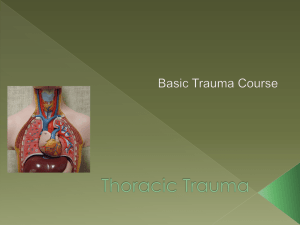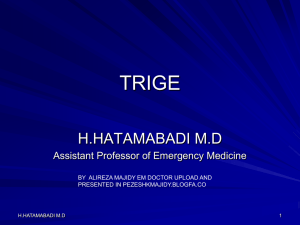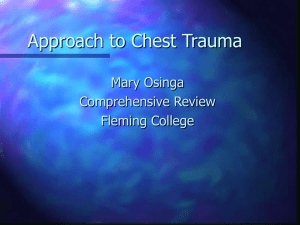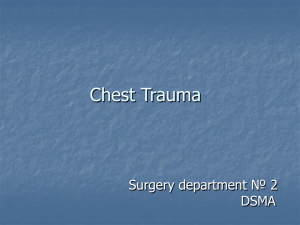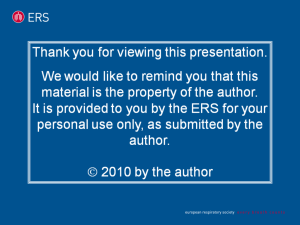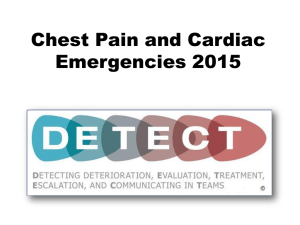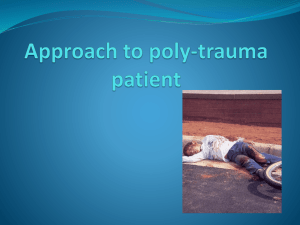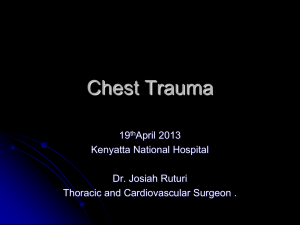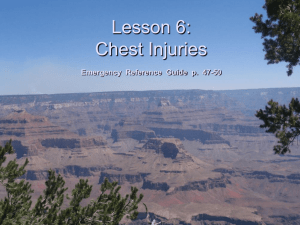Chest Trauma
advertisement
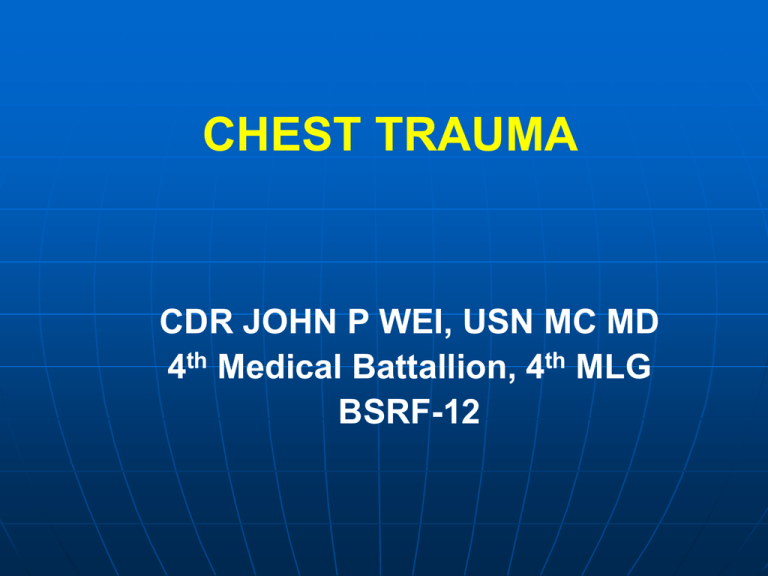
CHEST TRAUMA CDR JOHN P WEI, USN MC MD 4th Medical Battallion, 4th MLG BSRF-12 CHEST TRAUMA • • • • • • • • Blunt versus penetrating trauma Injury dependent on mechanism Motor vehicle accident Fall from height Physical assault Explosive blast Gunshot wound Stab wound CHEST TRAUMA Blunt force injuries from assault or fall from height Bony fractures Lung injuries Cardiac contusion CHEST TRAUMA Acceleration : Deceleration Injuries CHEST TRAUMA Penetrating injuries: Gunshot wounds Stabbing wounds CHEST TRAUMA • • • • Improved field diagnosis and treatment of life threatening conditions Rapid evacuation to higher level of care High risk of death despite acute intervention Need for prompt diagnosis and treatment CHEST TRAUMA Chest wall and ribs Lungs and pleura Great and thoracic vessels Heart and mediastinal structures Diaphragm CHEST TRAUMA Common Injuries • Rib fractures • Sternal fractures • Open or Closed Pneumothorax - unilateral / bilateral • Hemothorax • Hemopneumothorax CHEST TRAUMA Clinical consequences associated with: • Mechanism of injury • Location of injury • Associated injuries • Co-morbidities CHEST TRAUMA Blunt injuries managed non-operatively Management of airway / oxygenation Analgesia Intubation and ventilator support if needed Chest tubes if needed for pneumothorax or hemothorax CHEST TRAUMA PENETRATING INJURIES Trajectory across chest Mechanism due to knife or gunshot Type of bullet CHEST TRAUMA INITIAL MANAGEMENT • Airway, Breathing, Circulation • PRIMARY SURVEY • Identify & treat immediately life threatening conditions CHEST TRAUMA Early intervention directed toward diagnosing and treating: • Tension pneumothorax • Massive hemothorax • Open pneumothorax • Cardiac tamponade • Flail chest CHEST TRAUMA RADIOLOGIC TESTS Chest X-ray, usually portable Abdominal KUB and FAST Ultrasound Exam CAT scan, and CT Angiogram if needed CHEST TRAUMA Rib Fractures Physical Diagnosis: Deformity Localized pain Crepitus Treatment: Analgesia (PCA) Pulmonary toilet Observe for pneumothorax CHEST TRAUMA FLAIL CHEST Segment of chest wall that does not have continuity with rest of thoracic cage • Usually 2 fractures per rib in at least 2 ribs • Segment does not contribute to lung expansion • Disrupts normal pulmonary mechanics • Accompanied by pulmonary contusion in 50% of patients CHEST TRAUMA Flail Chest Diagnosis: • Paradoxical chest wall movement • Poor air movement • Hypoxia Therapy: • Pain control • Pulmonary & physical therapy • Intubation and ventilator support if needed • Fluid restriction if possible CHEST TRAUMA Pneumothorax or Hemothorax • most treated with simple tube thoracostomy CHEST TRAUMA Decompression of Tension Pneumothorax • large bore needle 2nd intercostal space midclavicular line • Chest tube as definitive treatment PULMONARY CONTUSION • • • • Common with blunt trauma May be associated with laceration of lung parenchyma Leakage of blood and fluid into interstitial spaces of lung Significant inflammatory reaction to blood components in the lung PULMONARY CONTUSION Parenchymal infiltrate seen on CXR adjacent to injured chest wall PULMONARY CONTUSION Indications for intubation • Respiratory distress • Hypoxia • Other injuries which compromise respiratory effort, such as abdominal or neurologic MYOCARDIAL CONTUSION • • • Physical bruising of the cardiac muscle Associated with fractures of the sternum Any severe anterior chest injury MYOCARDIAL CONTUSION DIAGNOSIS: Ectopy ST elevation Tachycardia Friction rub CPK enzymes, Troponin Monitor in ICU & treat dysrhythmias Serial enzymes Analgesia MASSIVE HEMOTHORAX • • • • From blunt or penetrating injuries 200cc – 1L in chest cavity seen on CXR Treat with chest tube, if immediate drainage is 1500 cc or if 250 cc/hr for 4 hours, then immediate thoracotomy Bleeding may be from ribs, lung, blood vessels AORTIC RUPTURE • • • • • • • • Abrupt deceleration or compression injury Sudden motion of heart / great vessels in chest Great vessel injury may occur in 0.3 => 10% penetrating trauma Often rapidly fatal 10% survive to hospital 20% survive > 1 hour 90% who reach hospital will die Early diagnosis and treatment AORTIC RUPTURE • • mechanism of injury widened mediastinum on CXR AORTIC RUPTURE • • • CT with contrast angiogram Contained injury treat with BP control Operative repair CARDIAC INJURY AND TAMPONADE • • • • Fatality rates > 80% Mostly ventricular, right > left Blood in pericardial sac causes tamponade Occurs with penetrating injuries DIAPHRAGM RUPTURE • • Associated with blunt trauma or blast injury Can be due to stab wounds DIAPHRAGM RUPTURE • • • Surgical repair to replace herniated contents back into abdomen Close muscular diaphragm to restore pulmonary function Chest tube to treat pneumothorax ESOPHAGEAL INJURY Most due to penetrating trauma Difficult to diagnosis If delayed or missed, rapid sepsis & high mortality Radiography Endoscopy Thoracoscopy Treatment: surgical repair via thoracotomy EMERGENCY THORACOTOMY ACUTE THORACOTOMY • Cardiac tamponade (relieved) • Vascular injury to thoracic outlet • Massive air leak • Endoscopic / radiographic evidence of tracheal or bronchial injury • Esophageal injury • Chest tube output • immediate evacuation of 1500ml blood • or > 250cc/ hour ER THORACOTOMY survival rates < 8% ER THORACOTOMY • • • • BLUNT injury with arrest Arriving without pulse/BP Penetrating injury with arrest High likelihood of isolated / correctable intra-thoracic injury • ER THORACOTOMY in presence of : • pulse • blood pressure • organized cardiac activity CHEST TUBE INSERTION Insertion Site • mid or anterior axillary line behind pectoralis major • above 5th rib avoid diaphragm CHEST TUBE INSERTION • • • Connect tube to underwater seal and suture in place Examine chest to check effect CXR to check placement and position SUMMARY • • • • Chest trauma may be due to blunt, penetrating or combination of causes Organs at risk include bony, hollow, as well as cardiovascular structures Immediate life threatening conditions need to be treated Maintenance of airway, oxygenation, and control of hemorrhage are important goals
